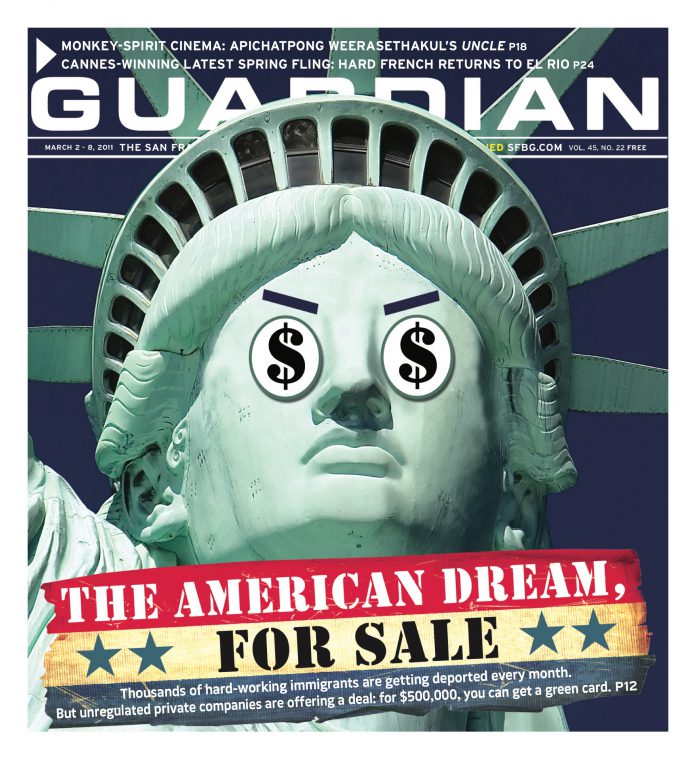arts@sfbg.com
FILM With its plentitude of female political stars, the Tea Party finds U.S. feminism at an interesting if inevitable developmental stage — wherein people who never would have gotten this far without liberationists’ path-clearing reject progressivism altogether. They no longer identify with a historically oppressed viewpoint, but rather from an angry, gender-neutral stance of entitlement allegedly stolen by cunning have-nots and slippery liberals.
They’ve never felt enough second-class citizenry to see gender as “the” issue. Yet right-wingers’ international panic button, “Islamic fundamentalists,” are also all about family values. Christian nations dominated world politics for so long it’s understandably hard for Westerners to grasp, let alone accept, that a different age-old faith looks set to control that discourse in our immediate future. (Buddhism, where are you? Oh yeah: busy ignoring all this.)
And the driving forces aren’t assimilationist, like those presumably nice folks whose mosque peacefully shares my Lower Polk neighborhood with a famous tranny nightclub and fire house. Rather, they are the pissed-off rank citizens, recruited by more privileged leaders to relatable activity outrage toward a deep disapproval of perceived Western moral decay. Just like Sarah Palin!
Does she see women’s issues as a significant concern? Most unlikely. She’s never been constrained by her family — more likely, as copious public exposure suggests, she’s been Santa-whipping its cadre of very stupid reindeer toward some destination, even if off a cliff (hello, Bristol, hello).
Palin would doubtless be horrified at the injustices dramatized in potent German drama When We Leave. It’s about Umay (Sibel Kekilli from 2004’s Head-On), who leaves a seriously abusive Istanbul husband with their young son Cem, seeking shelter from her Turkish family in Berlin. Initially welcoming, they grow hostile once the shame of her spousal abandonment ripples endlessly outward.
To keep Cem from being kidnapped and taken “home,” she eventually moves into a safe house. She gets a job, potential new boyfriend (the endearing Florian Lukas from 2008’s North Face), new apartment. But the pull of family is inexorable, and no location-shifting games are ultimately able to protect her.
Feo Aladag’s feature writing-directing debut goes out on a narrative limb with an improbable risk Umay takes at the two-thirds point. It strains credulity, but does heighten dramatic tension. It’s no spoiler to reveal that When We Leave‘s first moments reveal it deals with that near-unbridgeable cultural gap known as honor killings. Still, it might spoil something to say Aladag subsequently licks, seals, and otherwise pushes her emotional envelope to an excessively manipulated degree — D.W. Griffith himself might cry melodrama’s corn level exceeded.
Nonetheless, the real-world realities are more than real enough. Twenty years ago the 1991 Sally Field vehicle (imagine a world in which such things existed!) Not Without My Daughter struck many as suspect and kinda racist for dramatizing a real-life American woman’s attempt to flee her husband’s Iran with their child. Now When We Leave comes as no surprise.
Today, notions of the roles and rights of women in a just society differ painfully around the world, “developed” and otherwise. A basic tenet of U.N., E.U., and other bodies’ diplomatic interventions is that women be given equal rights — or at least legal freedom from domestic violence, rape, underage marriage, and other abuse. After so many decades of progress, it now seems the driving planetary political tide no longer pushes that-a-way.
When We Leave is a flawed drama that nonetheless underlines an increasing, confusing divide between ideological extremists “East” and “West.” How can we be on the brink of global chaos when both most-agitative sides basically agree women should be barefoot and pregnant? Excepting the exceptional women now in political power — too many are often silent, whether due to compromise or sheer denial.
WHEN WE LEAVE opens Fri/4 in Bay Area theaters.

